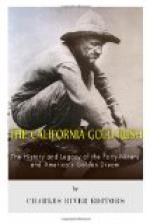But in addition to the miners who had made their stakes, who had given up the idea of mining, or who were merely waiting for the winter’s rains to be over to go back again to the diggings, an ever increasing immigration was coming to San Francisco with the sole idea of settling in that place. All classes of men were represented. Many of the big mercantile establishments of the East were sending out their agents. Independent merchants sought the rewards of speculation. Gamblers also perceived opportunities for big killings. Professional politicians and cheap lawyers, largely from the Southern States, unfortunately also saw their chance to obtain standing in a new community, having lost all standing in their own. The result of the mixing of these various chemical elements of society was an extraordinary boiling and bubbling.
When Commander Montgomery hoisted the American flag in 1846, the town of Yerba Buena, as San Francisco was called, had a population of about two hundred. Before the discovery of gold it developed under the influence of American enterprise normally and rationally into a prosperous little town with two hotels, a few private dwellings, and two wharves in the process of construction. Merchants had established themselves with connections in the Eastern States, in Great Britain, and South America. Just before the discovery of gold the population had increased to eight hundred and twelve.
The news of the placers practically emptied the town. It would be curious to know exactly how many human souls and chickens remained after Brannan’s California Star published the authentic news. The commonest necessary activities were utterly neglected, shops were closed and barricaded, merchandise was left rotting on the wharves and the beaches, and the prices of necessities rose to tremendous altitudes. The place looked as a deserted mining-camp does now. The few men left who would work wanted ten or even twenty dollars a day for the commonest labor.
However, the early pioneers were hard-headed citizens. Many of the shopkeepers and merchants, after a short experience of the mines, hurried back to make the inevitable fortune that must come to the middleman in these extraordinary times. Within the first eight weeks of the gold excitement two hundred and fifty thousand dollars in gold dust reached San Francisco, and within: the following eight weeks six hundred thousand dollars more came in. All of this was to purchase supplies at any price for the miners.




